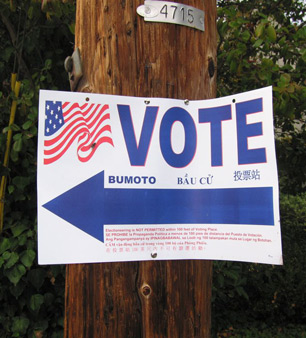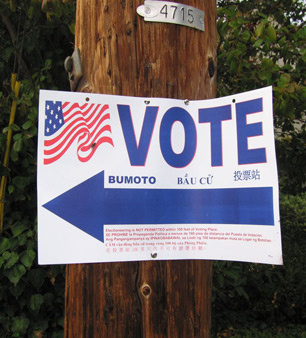Honest, paywall-free news is rare. Please support our boldly independent journalism with a donation of any size.
 (Photo: Ho John Lee / Flickr)Across the U.S., organizations like mine are racing against the clock to try to ensure that traditionally marginalized minority communities are registered to vote and have equal access to the polls. With shoestring budgets, and relying mainly on volunteers, we face obstacles which may grow even more formidable if state voter ID laws are upheld in the courts. Despite our best efforts, too many U.S. citizens (millions according to some estimates) may be excluded – through unfair ID requirements, voter intimidation, and other shenanigans like last minute polling place changes – from voting on November 6th.
(Photo: Ho John Lee / Flickr)Across the U.S., organizations like mine are racing against the clock to try to ensure that traditionally marginalized minority communities are registered to vote and have equal access to the polls. With shoestring budgets, and relying mainly on volunteers, we face obstacles which may grow even more formidable if state voter ID laws are upheld in the courts. Despite our best efforts, too many U.S. citizens (millions according to some estimates) may be excluded – through unfair ID requirements, voter intimidation, and other shenanigans like last minute polling place changes – from voting on November 6th.
In Venezuela, the National Electoral Council (CNE, following the Spanish abbreviation) has been engaged in a similar campaign to ours, though with a great deal more human, financial and technical resources. Regardless of what one may think of Venezuelan president Hugo Chávez and his policies, we can learn from the achievements of the CNE, an independent branch of the Venezuelan government that was established in 1999.
Since its creation, the CNE has massively registered new voters and created thousands of new voting centers. As a result, electoral participation in Venezuela has consistently grown and is now among the best in the world. Seventy-five percent of voters cast ballots in the presidential elections in 2006, and 81 percent of voters participated in the presidential elections there on October 7th. It was the most people to have ever voted in an election in Venezuela’s history, and it was praised as a triumph for democracy from all sides: the opposition, the government, the CNE, and foreign governments and organizations.
The CNE has also achieved great success in registering young people and members of traditionally disenfranchised Afro-descendent and indigenous communities in remote and deprived regions of the country. Moreover, Venezuela passed an amnesty law in 2004 to naturalize its undocumented immigrant population (mostly Colombians and Ecuadorians -10% of the population!). As a result, over 96% of the country’s eligible citizens are now registered to vote, as compared with only 65% in the U.S.
In Venezuela, elections – as in many other Latin American countries – are on Sundays in order to encourage greater participation.
In contrast, the Florida state legislature just banned early voting on the Sunday before Election Day, a practice which had resulted in significant numbers of minority voters heading to the polls in the November 2008 election.
Perhaps most importantly, the CNE has established a transparent and sophisticated electronic voting system which former president Jimmy Carter recently referred to as “the best in the world.”
Touch-screen electronic voting machines produce paper receipts confirming the voter’s selection. These receipts are then placed in sealed ballot boxes that can afterward be counted in order to verify that the electronic results are accurate. At the end of election day, members of both opposition and pro-government parties carry out random audits of over 50% of the boxes carrying paper receipts, a much greater statistical sample than is needed to discount the possibility of fraud. No wonder that even opposition voters had few complaints about the electoral process – other than long lines, due to the massive turnout.
In contrast, many voting systems in the U.S. are difficult to audit, and in the 2000 presidential election the results were so disputed that they had to be determined by the U.S. Supreme Court.
I have had the privilege of monitoring several elections in Venezuela over the last few years. Although there is much political polarization in the country, elections are well organized, massively participatory and considered a point of national pride by the citizenry no matter what their political inclination.
The U.S. may be an economically and technologically advanced nation, but in the area of elections, we could learn a thing or two from Venezuela. It’s unacceptable that the great American experiment in democracy continues to make it difficult for so many poor and minority citizens to exercise their most basic political right. It’s time for our nation to work together to ensure that in every state and in every county, all voting age, eligible citizens can register and vote in an atmosphere free from intimidation and unfair electoral practices.
Media that fights fascism
Truthout is funded almost entirely by readers — that’s why we can speak truth to power and cut against the mainstream narrative. But independent journalists at Truthout face mounting political repression under Trump.
We rely on your support to survive McCarthyist censorship. Please make a tax-deductible one-time or monthly donation.
